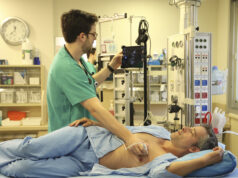UK-based charity Heart Research UK has given a Novel and Emerging Technologies (NET) Grant of £250,00 to Jack Lee (King’s College London, London, UK) and colleagues to further develop a test that uses artificial intelligence (AI) to identify patterns from blood flow simulations in thousands of coronary arteries. The aim of the computing algorithm is to make a pressure-based assessment of coronary artery narrowings safer, quicker and easier than at present.
According to a press release, if successful, the test would be less invasive, faster and more cost-effective than existing procedures. The press release notes that coronary angiography is the conventional method for looking at the coronary arteries and can be combined with a computer model of blood flow to estimate the pressure drop without carrying out invasive measurements on patients. It adds that there are already accurate methods to simulate the blood flow through blood vessels but they are time-consuming and require special training to perform.
In the alternative approach, Lee et al’s project will use an advanced computing algorithm known as “deep learning”—AI that identifies patterns from blood flow simulations in thousands of coronary arteries, so the computer “learns” how the geometry of the narrowings affects the pressure pattern. In turn, this information may allow the pressure drop across the coronary artery narrowing to be calculated directly and in real-time from the angiography images. Lee et al will test this new method on real patient data to demonstrate its clinical usefulness.
Lee comments: “The successful outcome of this research may help doctors decide on the best treatment for coronary heart disease using a test with reduced risk and less discomfort for patients. A fast and automatic method may also lead to shorter waiting times and cost savings for the NHS.”
Barbara Harpham, chief Executive at Heart Research UK, says: “This exciting project at King’s College London will use the most advanced computing methods to develop a new test with the aim of benefiting patients with coronary heart disease as soon as possible. We look forward to supporting Dr Lee and his team and seeing the results of this pioneering medical research.”












